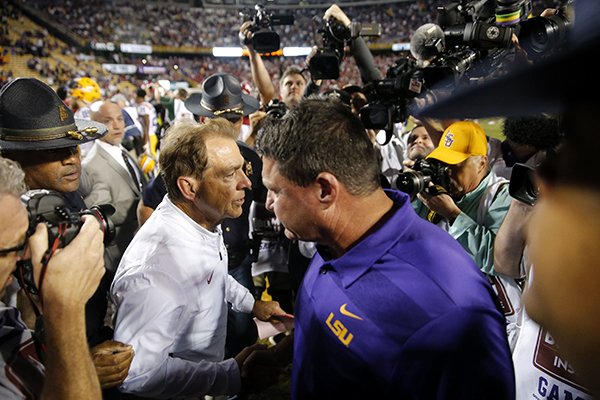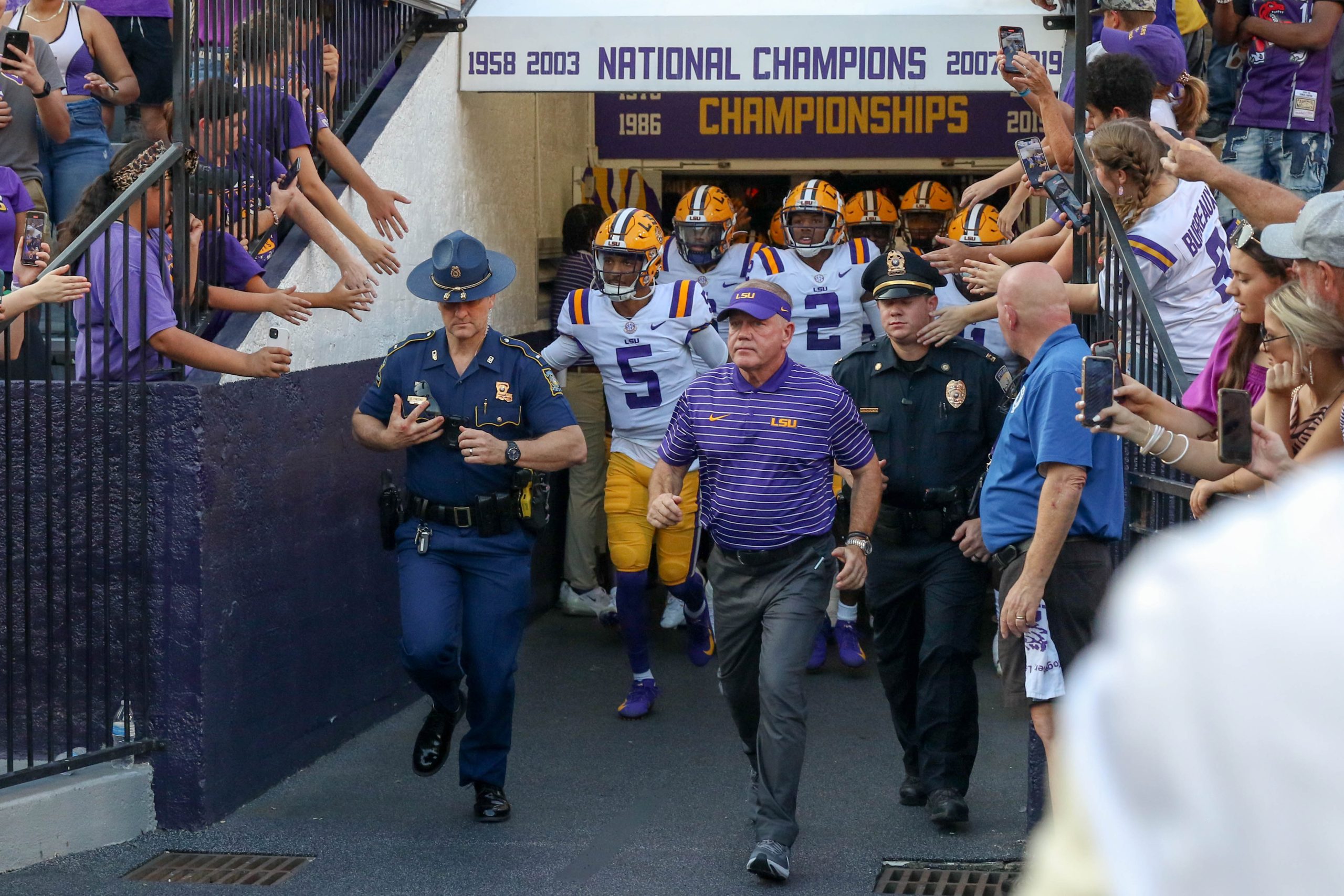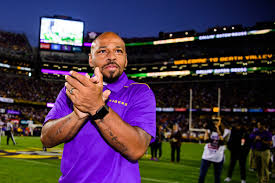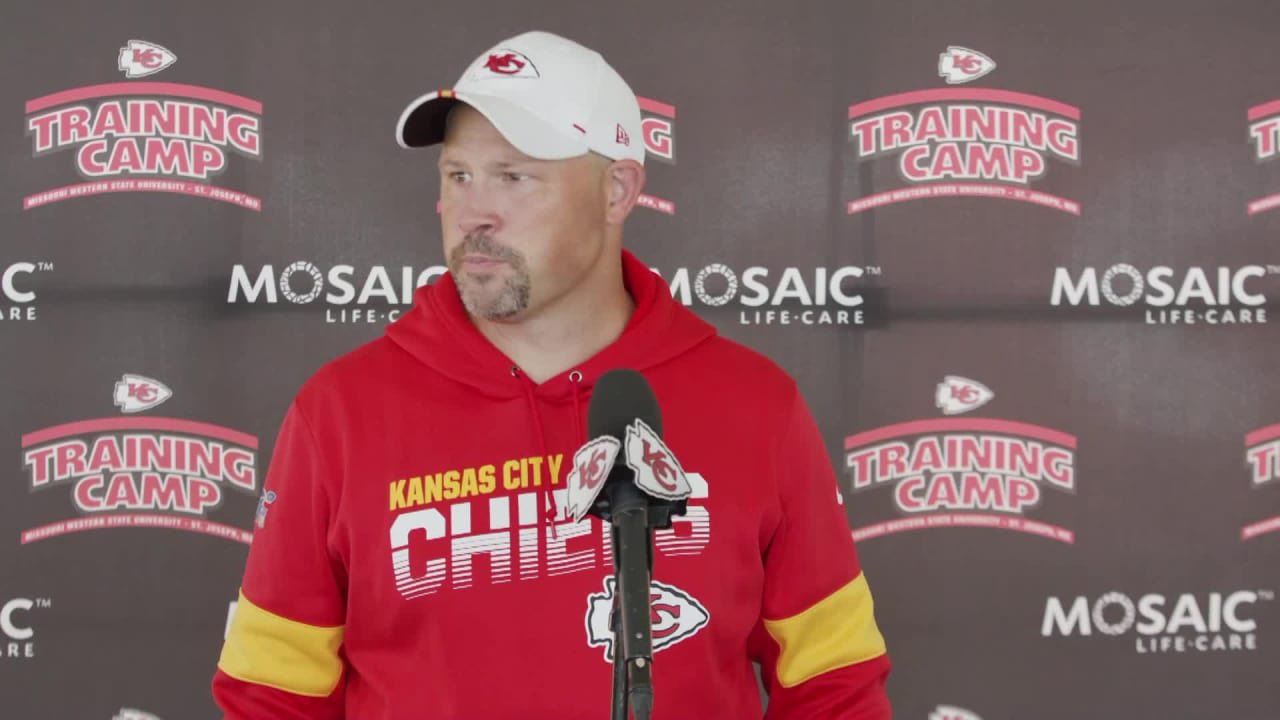
LSU and Alabama renew a rivalry Saturday in Tiger Stadium that has been highly competitive in the 21st Century as the primary powers of college football face off for the 22nd time in the new millennium.
The Tigers and Tide have combined for 40 percent of the national football championships in this century and boast 55 percent of the SEC titles since Nick Saban joined the league at LSU in 2000.
Alabama holds a slight 11-10 edge against LSU in this century, but the Tide is 10-3 vs. LSU in the last 12 seasons.
This series reveals the greatness of Saban more than any of the gaudy numbers he has racked up since bolting from Michigan State 21 Novembers ago.
Saban was 4-1 vs. Alabama while coaching at LSU and is 10-4 against the Tigers while pacing the sidelines for the Crimson invaders.
Despite missing out on two years of competition while toiling at Miami with the Dolphins in a pair of unspectacular NFL seasons, Saban is 14-5 overall in a matchup of conference titans that saw Les Miles win five times with Dennis Franchione and Ed Orgeron posting one victory each since 2000. No other coach has been victorious in 21st Century battles between LSU and Alabama.
No. 1 ranked and unbeaten Alabama appears destined to win another national crown this season while LSU is hoping to avoid its first losing season since a 3-8 fiasco in ’99 that ushered in the Saban Era.
Saban has proved he is the greatest coach of his generation and with competition more intense than ever, he ranks as the best of all-time until further notice. Orgeron has an opportunity for redemption in a season of discontent.
A win over Alabama is worth more than the trio of losses to Mississippi State, Missouri and Auburn. LSU has the weapons to battle the Sabanistas, but the Great One is seeking a measure of redemption himself. Saban is smarting from last year’s 46-41 defeat to the school that he spurned with regrets on both sides.
Alabama is primed to win big this week on the scoreboard and in the popular vote. For Orgeron, it will either be a reminder of how far ago last Nov. 9th was, or he will emerge as Saban’s greatest tormentor since Miles took two in a row from Bama in 2010 and 2011 only to be defeated 21-0 for the BCS Championship on Jan. 9, 2012.
Since that dreadful night in the Superdome, LSU is 1-7 in the series. Saturday will determine how close or far apart the programs are in the 21st season of the 21st Century.
LSU, Alabama and Nick Saban at LSU and Alabama since 2000
School Record SEC Titles National Titles. Head to Head
Alabama 206-55 6 5 11-10
LSU 204-62 5 3 10-11
Saban 211-39 8 6 14-5
Remembering an Auburn Star Who Helped LSU Sign Rudy Macklin
One of the most substantial games in LSU basketball history is soon to be 45 years old. After a seemingly insignificant 102-86 loss to Auburn on Jan. 3, 1976, Dale Brown initiated a telephone call that turned his program around and made him one of America’s most successful coaches for the next 17 years.
The War Eagles beat LSU at the Assembly Center to open the SEC season with the game televised across the Southeast. Brown was recruiting the heralded forward Rudy Macklin, who was watching the contest in Louisville and seeing that LSU was outmanned by an Auburn unit that featured future NBA stalwarts Mike Mitchell and Eddie Johnson.
Before his post-game interview with SEC commentator Joe Dean, Brown quickly called the Macklin home and implored his top recruiting target to come to Baton Rouge, finishing with the prophetic words, “Rudy, we need you.”
The 17-year-old Macklin was stunned to get a ring from the ubiquitous coach, then witness him on television seconds later with Dean, telling the world that Auburn won because “They have ten times better talent than we do.”
Brown stumbled through a disappointing fourth season at LSU, ending 12-14 overall and 5-13 in the SEC for a ninth place finish in a ten-team league. But he was successful in coaxing Macklin to leave Louisville, and three years later captured the first of four SEC titles.
Brown was correct about his assessment of the talent assembled at Auburn by Dr. Bob Davis. Mitchell was a remarkable frontcourt presence and remains the school’s top career rebounder and second leading scorer. He averaged 19.8 points per game in eleven NBA seasons and died of cancer at age 55 in 2011.
Last month, the backcourt star for the Auburn team 45 years ago, Eddie Johnson, died in a Florida state prison at age 65. Johnson played 10 NBA seasons and averaged 15.1 points per game.
“He was built like a linebacker and was as fast as they come with the ball in his hands putting it on the floor,” Mike Fratello, his coach with the Atlanta Hawks, told the New York Times last week.
The obituary of Johnson reads like a sordid tragedy. Battling manic depression and cocaine dependency, he managed to play at his game’s highest level for a decade. His life unraveled when his professional basketball career ended, and he was arrested at least 100 times.
From 1987-2001, Johnson was convicted of burglary, battery, drug sale and possession, violently resisting arrest and grand theft. In 2008, he was convicted of sexually assaulting an 8-year-old girl. He received a mandatory life sentence.
Dale Brown turned 85 on Halloween and has the satisfaction that his greatest players, Shaquille O’Neal, Macklin and Mahmoud Abdul-Rauf, are solid citizens with no arrests in their past.
Macklin scored more points than any Tiger not named Pete Maravich, grabbed more rebounds and won more games than any player in LSU history.
Ironically, Rudy’s trek to Louisiana was influenced by the wizardry of Eddie Johnson, the immensely gifted and troubled Auburn guard who blew away LSU 45 years ago and convinced Macklin that he was the player to bring basketball on the bayou back from the abyss.
“I came here to build something,” said Macklin.
And he did.




Be the first to comment